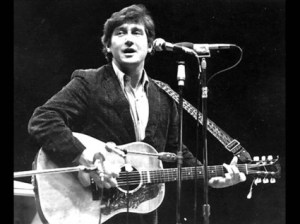 April 9, 1976 – Phil Ochs was born on December 19, 1940 in El Paso, Texas.
April 9, 1976 – Phil Ochs was born on December 19, 1940 in El Paso, Texas.
Being a 1960s protest singer-songwriter he wrote hundreds of songs and released eight albums. Politically, Phil described himself as a “left social democrat” who became an “early revolutionary” after the protests at the 1968 Democratic National Convention in Chicago led to a police riot, which had a profound effect on his state of mind.
He performed at many political events, including anti-Vietnam War and civil rights rallies, student events, and organized labor events over the course of his career, in addition to many concert appearances at such venues as New York City’s Town Hall and Carnegie Hall.
The Vietnam War ended on April 30th 1975. Phil planned a final “War Is Over” rally, which was held in New York’s Central Park on May 11. More than 100,000 people came to hear Phil, joined by Harry Belafonte, Odetta, Pete Seeger and others. He and Joan Baez sang a duet of “There but for Fortune” and he closed with his song “The War Is Over”—finally a true declaration that the war was over.
Michael Korolenko directed the 1984 film Chords of Fame, which featured Bill Burnett as Ochs. The film included interviews with people who had known Ochs, including Yippies Abbie Hoffman and Jerry Rubin, manager Harold Leventhal, and Mike Porco, the owner of Gerde’s Folk City. Chords of Fame also included performances of Ochs songs by folk musicians who knew him, including Bob Gibson, Pete Seeger, Tom Paxton, Dave Van Ronk, and Eric Andersen.
Ochs’s mental stability declined in the 1970s. He eventually succumbed to a number of problems including bipolar disorder and alcoholism. Sadly Phil’s drinking became more and more of a problem, and his behavior turned increasingly very erratic. Afflicted with serious depression, he hung himself at his sister’s home in Queens, New York on April 9, 1976. He was 35.








[…] in 1976, Melanie appeared at the tribute concert for Phil Ochs, who had committed suicide on April 9 that year. Held on May 28 at New York City’s Felt […]